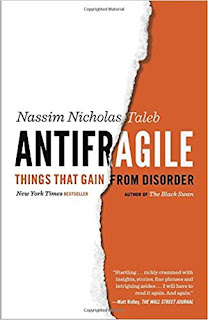TestOps - the most antifragile testing role

I have read many fascinating books in 2017 which influenced me a lot. Among the very best are Nassim Nicholas Taleb’s Fooled by Randomness, The Black Swan and Antifragile which is perhaps the most important, although which can’t be fully understood without reading the remaining two. Taleb has a very original style which is very unique, but I noticed few similarities to Thinking Fast and Slow (Daniel Kahneman) and Surely You’re Joking, Mr. Feynman! (Richard Feynman). Taleb loves science (especially math), but his books aren’t strictly scientific. There are multiple unproven commonsense theories which I find very smart.
How to be antifragile?
Fragility is the quality of being easily broken or damaged by various activities. You may say the opposite of fragility is toughness, but is it really the case? If we replace ‘easily broken or damaged by various activities’ into ‘easily strengthened or improved by various activities’ we instantly realize that such word is missing in our dictionary.
Well, it was missing. Thanks to Nassim Nicholas Taleb we can come up with the following definition:
Antifragility is the quality of being strengthened or improved by various activities
If you stop here and think for a moment you may realize that there are not many things which can be labeled as antifragile. Wine gets better after each year, but after opening, it quickly degenerates. Rock, even though looks indestructible doesn’t improve in any way. What about the content of the book? It usually loses its value over time and never gets automatically updated. Does publishing second edition of the book increases its antifragility? Nope, it still can’t improve by itself. So which things are antifragile? There is interesting discussion on Quorawhich lists: optionality, mother nature and evolution.
Let’s discuss optionality. How can we take advantage of it? Imagine you and your spouse are working full-time job in company A. As a first step for being more antifragile you should diversify companies. One of you should quit current job and move to company B. In such scenario if comapany A goes bankrupt you still have a steady income from company B.
What if you want to try to create a new company? Should both of you quit your current jobs? If you want to be antifragile it would be best if none of you quit. You should work after hours and during the weekends. This minimises the risk of a new company going down (which has high probability) and still leaves you some chance of a huge money from the new business (which has low probability).
As you probably see already completely antifragile things are extremely rare. We should rather make comparisons. Which of two options are more antifragile?
Let’s consider two career paths: midwife and personal trainer. Theoretically in the era of people who are scared to lift anything in gym without the coach assistance second occupation looks better. Which of those are more antifragile though? Most likely midwife because there is very little chance of people suddenly stop having children. Personal trainers can be replaced with tutorials, videos, or even coaches appointed full-time by gym.
Why is TestOps antifragile?
As you probably now already I’m a huge fan of a somehow abstract term - TestOps. I have resurrected this term from oblivion few months ago and now a lot of people use it. To put it shortly TestOps can be described as a strong desire to automate everything. Please have in mind that it’s not only about test automation. I mean also Continuous Integration and Continuous Delivery. Senior TestOps Enginner in my opinion should be master of Unix who knows how to make one-click production deployment.
TestOps Engineer is also very technical. He can do proper performance test (i.e. fully understand results), he can hack if necessary, he can also work with his peers following business priorities. If necessary he can even test application manually. I have created a graph with potential TestOps Engineer job switches:

As you can see as a TestOps expert you shouldn’t really be worried about job loss. You have almost unlimited options on what to do next. More importantly with TestOps experience you can easily follow the path you love. Whether it’s business (Product Owner), Management (Team Leader) or Software Reliability Engineer (who does a lot of testing in production).
Why it’s better to learn programming first before testing basics?
My acquaintance from days in which I played StarCraft a lot has recently created a very good blog post about his job switch into software testing( article in polish, please use Google translator). I’m surprised that polish Software Testing Facebook group found it controversial. One of the most the discussed item was the following advice (translation by me):
If you want to become a software tester start learning programming first, testing basics later.
It’s worth to analyse this statement in antifragile context. Which skill (programming vs testing) guarantees you more job possibilities? The answer is very simple here - programming. You can become both software developer and tester. Even when it comes to testing job chances trust me, a lot of companies care more about test development skills then ISTQB formulas. Start with programming basics!
Tags: testing thoughts, testops
Categories: TestOps
Updated:
